READER COMMENTS ON
"New Version of Holt's Election Reform Bill Would Institutionalize Touch-Screen Voting, Secret Software"
(30 Responses so far...)
COMMENT #1 [Permalink]
...
NYCartist
said on 2/20/2009 @ 1:44 pm PT...
So, what's a disabled voter to do? (I am on a permanent list of Absentee Ballots for Homebound Disabled, which takes care of the problems: will I be well enough to go vote on Election Day, and will my polling place be wheelchair accessible?)
Believe it or not: when NYC was playing around with what to do for disabled voters, I was asked if I wanted to vote by telephone, in a survey. I said, "NO!".
I recall that in the last election, there was one polling site per borough, that was machine/disabled friendly, but no transportation was available directly from your home to the polling site. (I suppose, people who use the dreadful Access A Ride vans could call days in advance for van that's a small bus, but they have had a record of over 10% noshow...)
There needs to be a way for disabled people:wheelchair users, blind, others to vote privately and have our votes be counted. I do want to point out that many places do not provide wheelchair accessible polling sites, even though required by law. On absentee ballots:there's no universal rules, such as size of ballot, free postage for the return of the ballot. It's a mess.
Why does Congressmember Holt resist good information for all these years? Why does the Democratic Party deny theft of votes?
COMMENT #2 [Permalink]
...
Phil
said on 2/20/2009 @ 3:00 pm PT...
Go ahead Holt you jackass prick!
Attempt again to screw the whole country.
Since I can't contact you cause your a fucking elitist prick hiding behind your district. I can only contact my FRIENDS in NJ and tell them to write your ass.
One day your stupid ass bills will be outlawed.
And one day you won't be an official, you'll be a piece of shit just like me. Maybe you'll take a basic digital logic electronics class and realize the piece of crap you are.
You idiot! History will show your leadership isn't leadership but FASCISM!
And dear Disabled Voters.
How did you vote before electronics existed? Nuff said.
Quit your bitching and destroying the non-disabled country's vote!
We don't need your unvalidatable signals!
Provide a method that doesn't allow everyone vote to be exploited because no oversight can be provided or shut the hell up!
The damage from the abusive use of electronics is too much.
It's not that I don't want you to vote, it's that I don't want your technology being exploited. There is no electronic tabulation device that can not be exploited. So if you want to print your shit with a computer fine. But ONLY you. Not US too!
GOD DAMN IT!
BURN THIS BILL INTO THE FOUR WINDS WHERE IT BELONGS!
COMMENT #3 [Permalink]
...
Mark A. Adams JD/MBA
said on 2/20/2009 @ 3:04 pm PT...
So, Holt is still for secret vote counting and giving simple tabulation programs a higher level of protection than that which is afforded real trade secrets. Why did the fools in NJ re-elect this clown? Oh, that's right. The votes were counted in secret.
COMMENT #4 [Permalink]
...
Phil
said on 2/20/2009 @ 3:08 pm PT...
MARK, EXACTLY!
The same crap in California (I forget the link now) where we voted FOR more electronic voting machines ON ELECTRONIC VOTING MACHINES.
That shit should be revoked!
Still out of all this time there's no 100% compare of a live election to 100% paper ballots.
THERE NEVER WILL BE, AND IT REALLY PISSES ME OFF.
COMMENT #5 [Permalink]
...
the zapkitty
said on 2/20/2009 @ 4:05 pm PT...
... NYCartist asked...
"So, what's a disabled voter to do?"
Well, that's the problem in a nutshell.
As someone who was blinded by diabetic retinopathy I find myself, like you, caught in the crossfire between election integrity and the right of the disabled to vote and to vote privately and to vote independently... and there is still no meeting ground between disability and those rights. and then Electronic Voting Machines really screwed the situation up for the disabled.
That was because the disabled, especially the blind, were used by unscrupulous EVM vendors and equally unscrupulous political strategists to add pressure to the efforts to railroad unknowing politicians and activists into adopting e-voting.
The disabled were waved as a bloody shirt under the pretense that EVM's conferred upon disabled voters that ability to vote privately and independently... and EVM's did no such thing. By the laws of physics they can't.
If your particular circumstances required you to trust someone to help you cast your vote before EVM's, then with EVM's you are still trusting someone with your vote even if you're alone in the voting booth... you're trusting whoever built the machine, whoever wrote the code that's supposed to be on the machine, whoever wrote the code that's actually running on the machine the instant you cast your ballot, whoever wrote the code that's running on the machine after you cast your ballot, whoever wrote the code that's running at any given instance on the central tabulators... and it doesn't begin or end there.
And Electronic Ballot Marking Devices have the same vulnerabilities as EVM's.
That's what set Phil off on his rant... not the struggle of the disabled to vote, but the fact that the disabled were used as an excuse to ram the insanity of EVM's down everyones throats.
And, sadly, an understandably irate Phil screwed up thusly:
"Quit your bitching and destroying the non-disabled country's vote!"
Phil, chill 
... because as sure as hell Holt et al will use responses such as yours to privately brand all election integrity activists as somehow being "anti-disabled" even though that was not your intent.
You are basically taking out your anger on people who are even more of a victim of the situation than you are... they were promised the impossible, they were promised that electronics would give them the ability to vote privately and independently. It's not their fault.
I think an apology is in order.
COMMENT #6 [Permalink]
...
Voter
said on 2/20/2009 @ 5:42 pm PT...
Go ahead everyone, keep on attacking one of the best friends of fair elections in Congress.
Keep on calling Rep. Holt "clown", "idiot", "jackass", "piece of shit", and "fucking elitist prick."
Let him have it. Again.
Diebold, ES&S, Hart, and Sequoia are loving this.
COMMENT #7 [Permalink]
...
Agent 99
said on 2/20/2009 @ 5:44 pm PT...
Okay. Rep. Holt is a "clown", "idiot", "jackass", "piece of shit", and "fucking elitist prick" for persisting in trying to disenfranchise us all. Happy?
COMMENT #8 [Permalink]
...
Voter
said on 2/20/2009 @ 5:52 pm PT...
I'm already voting on a paperless DRE and so am probably already disenfranchised.
Might have been different if we had more support and less name-calling in 2007-early 2007.
But some people just like to post obscenities and call names.
Oh well.
As I said Diebold, ES&S, Hart, and Sequoia are loving this. I bet they're just passing the popcorn and having a ball.
Thanks, all.
COMMENT #9 [Permalink]
...
Agent 99
said on 2/20/2009 @ 6:27 pm PT...
Clearly, Voter, Rush Holt is no such thing as one of the best friends of fair elections in Congress. He refused to be educated into making his first attempt into a worthy document, and we were lucky it didn't pass into law. Now he's trying to do it again, with "improvements" that don't get rid of THE problem. There's no possibility he still does not understand this, and almost no possibility left that he's acting in good faith, on any level. So it might well do a lot more good than harm to yell our bloody heads off about it... yell and swear so loudly the fucker will have to slink back into the hole he crawled out of to be this kind of advocate for electronic voting machines.
COMMENT #10 [Permalink]
...
Voter
said on 2/20/2009 @ 7:26 pm PT...
Here's the current Hate Holt score card:
clown
idiot
jackass
piece of shit
fucking elitist prick
Adding "fucker"
Diebold & ES&S, you gettin' this? 
COMMENT #11 [Permalink]
...
the zapkitty
said on 2/20/2009 @ 8:59 pm PT...
Voter (but which voter? there are so many...), is this a great oppo research opportunity or what? 
But rants in blog comments, however laced with profanity some might be, rants weren't what derailed Holt's last effort(s)... it was the cogent analysis in blog comments that kept pointing out that the bill had been fatally compromised by EVM interests.
And then on the political level.. instead of addressing the core flaws in the bill straight up Holt kept trying to fix just enough to blunt the worst of the complaints while continually compromising on behalf of EVM interests at the same time. As the bill kept mutating it drifted into a downward spiral of two steps back for every step forward. And then Holt tried playing certain election integrity factions off against each other which gave him a temporary boost in sheer noise level... and doomed his bill when the EI factions realized what "Mr. Election Integrity" had been up to.
I will analyze his latest on its own merits but I am curious as to what he thought he learned last time 'round...
Given his known history of trying to game EI advocates it would seem to be a relevant question.
COMMENT #12 [Permalink]
...
Voter
said on 2/20/2009 @ 11:53 pm PT...
Gee Zapkitty, you flatter yourself.
I hate to burst your bubble, but the blog noise on HR 811 was so far off the Capitol Hill radar, it was laughable to see some of these advocates priding themselves that they "killed the bill."
No, the major damage was done elsewhere, but if the Election Integrity community had stuck together, or at least not called out the circular firing squad on each other, it might have helped. But no, more fun to wail to the blogosphere and call people vulgar names rather than really do something that will improve our elections, I guess.
I agree with you that the EI community was AND IS being gamed big time, but it has never been and is not now being gamed by Congressman Holt.
COMMENT #13 [Permalink]
...
Agent 99
said on 2/21/2009 @ 1:25 am PT...
Voter @ 12
You appear to be gaming something. This thread. If you are going to keep up with your preposterous assertions, might I suggest you go back to the posts here about the first attempt and get a little better idea of what was done or not done by certain bloggers and the people commenting? As for Zap, you are flattering yourself.
If certain bloggers and people in their communities had not started screaming, that bill would very likely have gone through. There was a lot of support from people who should not have been supporting it, and what you call a "circular firing squad" was people who knew the bill to be crap fighting those who didn't choose to look at it that way... for the usual "better than nothing" kind of reasons, when it was NOT better than nothing. It was actually worse in that it would make it seem as though something was improved.
And not good enough is not good at all in this matter.
And I don't know how you can make the assertion that Holt is innocent of what you call gaming the EI Community. Once again, he is no longer ignorant of the imperatives of election integrity and yet he's come up with this. To use your non-vulgar term, he's certainly gaming the EI community, and all the voters in this country.
Despite your hot air about caring for election integrity, I doubt you'd post a few of these choice little attempts to derail straight talk, so, if you plan on keeping it up, you should read our RULES FOR COMMENTING AT BRAD BLOG, and steer clear of purposely framing things askew and disinformation.
COMMENT #14 [Permalink]
...
Ancient
said on 2/21/2009 @ 6:38 am PT...
Oh yeah, lets once again spend billions more for secrete software! This is America, where we have billions of next to worthless dollars to burn, while a two dollar box of pencils sits waiting for those who care enough to exert their own energy to simply mark a paper ballot and possibly come back to watch those ballots being hand counted are all but ignored to the great glee of an industry who stands to make more excessive profits from ignorance and keep their guys in our government assuring their control over our government. All in the name of serving the disabled! ONLY IN A DUMBED DOWN OVER WORKED COUNTRY CAN CRAP LIKE THIS PASS FOR INTELLIGENCE!
Furthermore Voter, I myself defended holt on his effort to create a reform bill, but that was before I watched him time and again skirt the meat of the problem of electronic voting systems. I have now lost my respect after watching his sly wording time and again. I have worked with disabled folks and want to see a secure voting system created for them, but propreitary software will NEVER ensure clean elections or VOTER CONFIDENCE.
.
.
.
!
COMMENT #15 [Permalink]
...
Floridiot
said on 2/21/2009 @ 7:18 am PT...
Put it this way, for as often as EVM's are used, they're outdated by the next time you use them.
The cost of bug-fixing/updating them for every election costs too fucking much money, period.
Show everyone the actual cost of using these pieces of shit and they will go away.
Prohibitive cost is the answer to the end of them, everything else is just not getting through to the public.
COMMENT #16 [Permalink]
...
Ancient
said on 2/21/2009 @ 7:32 am PT...
Excuse me, that should have been two dollar box of pens and proprietary in the last sentence. 
COMMENT #17 [Permalink]
...
NateTG
said on 2/21/2009 @ 7:33 am PT...
In principle, BMDs with proprietary software can be just fine as long as they produce an independentaly human readable ballot. By that, I mean a ballot which lists the race and the person, rather than a sheet of paper with random dots which requires additional information to determine voter intent.
Imagine, for example, that a local ballot is published as a PDF on a web site, and then each voter marks it up on a computer, prints it out, and hands the printout to the precinct counting site. There's a whole slew of uncontrolled software involved in this process - from the operating system to the printer drivers, but I'd still be reasonably confident that my vote could be accurately counted, and provided the ballot was independently readable, my intent was clear.
COMMENT #18 [Permalink]
...
czaragorn
said on 2/21/2009 @ 8:07 am PT...
I'd love to see some data from a county that switched from hand-marked, hand-counted paper ballots to electronics, over the years, on how much the county spent per voter per election in the transition years and on to the present. Americans for the most part may not give two hoots for integrity and democracy and so on, but they sure as hell still give a shit about money!
COMMENT #19 [Permalink]
...
Jim Cirile
said on 2/21/2009 @ 11:08 am PT...
What is WRONG with Rep. Holt? It's REALLY simple: voter-verified publicly hand-counted paper ballots. Period. Full stop. End . Of. Story.
Jeeeeezzz!
COMMENT #20 [Permalink]
...
Brad Friedman
said on 2/21/2009 @ 12:17 pm PT...
"NateTG" @ 17 said:
In principle, BMDs with proprietary software can be just fine as long as they produce an independentaly human readable ballot...
...
...I'd still be reasonably confident that my vote could be accurately counted
The problem here, among many, "NateTG", is that why you might be "reasonably confident that [your] vote could be accurately counted", there is no reason for *me* to believe that your vote *was* accurately counted. There is not even reason for me to believe that your vote was accurately recorded as per your intent.
I have no way of knowing that you bothered to even look at your print out, much less that you noticed whether votes were flipped on it or not (see the graf in the original article above, concerning the Caltech/MIT and Rice University studies).
Why should I have to believe in faith-based voting? We've got that now. So, um, no thanks.
COMMENT #21 [Permalink]
...
Brad Friedman
said on 2/21/2009 @ 12:37 pm PT...
"Voter" -
Where to start with your comments?
As to whether or not the blog community had any effect on the last bill, I'd suggest that the new version of the bill offers evidence, of course, that they did. We were told (time and again, for months) that it was impossible to ban DREs last time, but lo and behold, this time, the bill calls for them to be banned. Was that something that someone on Capitol Hill (lobbyists, other legislators) were calling for last time? Or did that come from the EI/blogging community?
Of course, had we all supported the bill last time, you might have been voting on DREs with "paper trails" now, with no chance of seeing paper ballots ever. So even if the new version passes, as problematic as it is, you'll be far better off than you would have been, had the '07 version passed. You're welcome.
As to those crowing about having "killed the bill" last time, as you charge, well, I can't speak to them, as we've done no such crowing, nor were we happy that Holt decided to kill his own bill, through dishonest and manipulative lobbying tacticts, rather than find agreements with the EI/Blogging community so that we could have all marched in lock step to support the bill.
Finally, as to Mr. Holt being a wonderful man, or however else you've created his hagiography here. I have no idea what sort of person he is, as I don't know him on a personal level.
I do know, however, that both Holt and his lieutenants repeatedly misrepresented (and yes, often out and out lied) about the contents of the previous bill. He told me personally that the last bill would have banned DREs (which he knows it wouldn't have, given the fact that he's changed it to do so this time). He also told others that it would have required a paper ballot for all (which he knows it wouldn't have, given the fact that he's changed it do so this time).
And this time, he's already off to a bad start by doing the same thing as last time: mispresenting the contents of his own bill. That, even despite my private attempt to encourage him to NOT do so. As you'll note in the quoted response from him in the original article, he claims that the bill "requires a voter-marked paper ballot for every vote cast". I had hoped to give them a chance to restate that point, since it is patently untrue, as evidenced by the very first page of the very first section of his very own bill.
Whether he's the "best friend of EI on Capitol Hill" (or however you phrased it), I'll not state a position. And yes, I agree that it's not useful for commenters here to call him names, and so forth. But whether or not he is well-intentioned, makes little difference. What is rather appalling here --- both then and now --- is for him to continually misrepresent what his bill does and doesn't do, in hopes of manipulating/tricking folks into supporting it.
I support his efforts in hoping to reform our dreadful electoral system. I do not support his being disingenuous about what the bill does and doesn't do, nor about what is required to see it passed into law. When he, or his staffers, do not tell the truth, they need to be held accountable, and the truth needs to be told. That's what I did last time, that's what I will do again this time.
Period.
I realize that there is no such thing as perfect legislation. That's not the question. The question is what does the bill do and not do. My job is to make that clear. Particularly since Holt and his office seem to consistently have a problem doing so themselves. That's a pity, as his NJ constituents deserve better, as do EI advocates, as does everyone in America, since it's his bill that will likely move forward in the U.S. House towards becoming law.
I'm sorry you don't feel the need to stand up and demand someone like him be transparent, straight-forward, and honest about the contents of such a bill, of such crucial import to both you, and the entire nation.
COMMENT #22 [Permalink]
...
Phil
said on 2/22/2009 @ 12:37 am PT...
Been away, and clearly as Zapkitty so well said, and so well understands. I owe NYCartist and other disabled an apology. Late to getting that apology out cause I frankly have been curled up in pain and AFK (away from the keys.)
(yeah that neck pain still, now it feels like my brain stem cracks, and pain shooting up side of head, causes blurred vision, headaches, delirium, ear pressure and extreme anger to all who deal with me and no I still don't have a doctor or any health care for going on 23 years now. I am thinking I might know what Old yeller (that's me) is gonna get in the end here, just ain't time yet.)
BEGIN APOLOGY
To all Disabled. I am Sorry.
It's unfortunate, I get so angry from seeing this whole nonsense with these electronic vote tabulation devices going and trampling everyone's right to vote, I get in a hurry trying to cram down my thoughts, using brevity, using spell checking, code sometimes, being human I make mistakes. There are so many word games being played on both sides, technical terms being used, all this costly complexity has been added onto something that children in a classroom could figure out how to do honestly with paper and pencils.
In a way, I sympathize with the idea of allowing the disabled to use something that can help print a ballot out, but not at the cost of forcing the same thing to be used for everyone else, and especially stepping it all up a notch, in where the final tabulation result is electronically compiled. The danger of these machines now being realized should be so great that a voter really MUST HAVE A NEED TO BE ALLOWED. Furthermore the end result of the process MUST be treated the same as non ballot marking devices. The end result being as per the Creekside Declaration. (which I don't think I got a chance to sign!!!)
No matter what the topic, if it involves these machines....I feel like a broken record player, repeating over and over and over about electronic vote tabulation devices. While simultaneously watching more and more egregious exploitations in the system, against voters, against pollwatchers, against anyone who dare raise this issue. For me it's LOGIC. For the evil it's LOGISTICS and CHRONOLOGY (Timing as a weapon.)
And worse yet, the results of bad people turned into officials who then go on and abuse just about every topic I can now comprehend. Every office, ever agency, every thing.
Zapkitty (Who I have A LOT of respect and love for) has a really tight grasp on how I feel about this specific issue in regards to the disabled. I knew (internally in the back of my mind actually) the moment I typed the word "non-disabled" something was wrong with that sentence. I was in a hurry, and trying to be brief. That's why your all here to straighten my ass out.
END OF APOLOGY.
BEGIN RANT
I am literally at the point now, where I dread voting. I don't even WANT to go, because I know those god damn machines are there. Last time I voted I came very close to being arrested. If I would have turned my camera on, I would have been toast. The complexity with dealing with the Secretary of State and all this shit is too much.
I should just give the fuck up.
The criminals have obviously won.
They deny electronic vote tabulation devices caused the problems, but I SAY THEY..
They destroyed the constitution.
They destroyed the economy.
They control the media.
They control government.
They control justice.
They control military.
WHAT SAY YOU?
If you really want to vote, it's time you come up with how to do it. If your disabled, how you going to do it so it don't screw the whole country up?
I told you what I know from the electronics point of view. No electronics can be trusted or validated. Forget the manufacturer. Forget the software. All are exploitable.
My one second dare.
DARE YOU MANUFACTURES. (watch now they will mount their crap all surface mount and close to a rubber against steel so the board will flex instead of crack.) fine.. gimme one tool, a screwdriver. Pop the cover. ONE SECOND. Yes I plan to destroy something in one second. I know any IC is a target. Or Yank wires to the power supply.
My point is electronics can not be trusted. From the doping level, to firmware, to who services it, to just plain parts burn UP!
Zero trust.
Yet we currently have 100% trust.
Someone else take up the torch.
I had it with this war.
I am miserable every day of my life now.
I have resentments. Hatred. I scream and yell, and cuss every day. Everything and everyone I know is now affected by it.
All to no avail.
I can use California as an example.
We had the top to bottom review.
I remember the next election or one prior (I forget now) had paper ballots DROPPED in the AUX slot. (were they counted optic scan later I don't know)
Next election, machines back again, this time it's in the optical scan slot. I refused to put mine in. I made them get the fucking key and open the AUX slot for ME. Now did that go to an op scan later? I dunno.
I am fucking sick of it. SICK OF IT.
Go the fuck ahead elect the same motherfuckers. Drive this country over a cliff.
Because I don't make a profit. I am not a Journalist, or a "Qualified Tech."
So my voice is shit. Just like the piece of shit I have become. I say again Holt.. One day you will be a piece of shit just like me.
COMMENT #23 [Permalink]
...
Lev
said on 2/22/2009 @ 11:33 am PT...
I like the Brad Blog but I do tend to think that the people here get too wrapped up in the minutia of vote-rigging and far too often ignore the much larger issue that would keep the U.S. a non-democratic country even if we all had paper ballots and international election monitors: That issue is that there is NOBODY TO VOTE FOR regardless of whether or not it is counted. This latest election is a sterling example of that fact. Daily Obama is showing that it didn't matter who we voted for because we would have ended up with a neo-con as president either way.
Here's how it works in America: The ruling establishment (the Council on Foreign Relations, the Trilateral Commission and the Bilderberg Group) preserve the status quo by backing candidates from both (increasingly similar) parties. Everyone who is a major candidate for president from either party is wholly owned by these "powers that be" and anyone who presents a GENUINE alternative, anyone who offers REAL change is quickly marginalized by the corporate-owned media as a loony. A perfect example is Dennis Kucinich. They know he isn't one of them so what question does he get asked at the phony "debate"? Some nonsense question about UFOs. So no matter how he answers he gets associated with UFOs. See how they operate? Since they control all the major candidates it doesn't matter in the slightest either who we vote for or if our votes are counted. We end up with a neo-con establishmentarian piece of shit either way. So either way nothing changes and either way we lose and the C.F.R.-Trilateral-Bilderberg puppetmasters win.
What's truly amazing though is that the vast majority of the American people is so brain dead as to actually think that they have a chance to change anything by voting for one of the two establishment-approved candidates. The secret to maintaining the status quo is not either having "their guy" win NOR is it "who counts the votes" that matters. The secret is CONTROLLING WHAT CHOICES ARE AVAILABLE in the first place.
COMMENT #24 [Permalink]
...
MarkH
said on 2/22/2009 @ 1:34 pm PT...
I don't get it. What is Holt doing? He's clearly not stupid and yet keeps writing stupid bills. He should have a conference with Brad.
COMMENT #25 [Permalink]
...
Phil
said on 2/23/2009 @ 1:41 pm PT...
Controlling what choices are available, is the same as chronology as a weapon. -IMHO
But it isn't the only problem.
Electronics are too.
Electronics are FAST.
Courts are SLOW.
Add in a few pieces of crap (officials), and you have a situation where we are delayed long enough for the corrupt to keep power.
De fund the courts and officials?
Arm the citizens and allow them to carry arms to non-violently uphold the law?
Smash the machines?
I don't know what the answer is. But I am sick of it. Really sick of it.
A handfull of people are fighting --- in the big picture. Good people. But only a handfull. We may be outnumbered by corruption at this point.
the good news is they are getting everything they want. Maybe we should give them more than they can handle.
COMMENT #26 [Permalink]
...
Lev
said on 2/23/2009 @ 4:00 pm PT...
One thing that has to be done is to take money completely out of politics. There should be NO privately funded campaigns. I say give each candidate from a Kucinich to an Obama to a McCain the same (small) amount of funding, cut the length of the election campaigns from two years to about two months, and let them be free to spend their public financing any way they see fit. Maybe this way the public would get to decide based on someone's actual message rather than whether or not they see that person's t.v. ads hammered into their brain 20 times a day. Without private financing of campaigns the C.F.R.-Trilateral-Bilderberg scum wouldn't be able to buy candidates.
There also needs to be a recall or "no confidence" mechanism like in parliamentary democracies, where if those in power become obviously destructive to the people's needs then a vote of no confidence can be held and a snap election to decide who gets to form a new government.
And end lobbying as a profession. If special interests want to twist the arm of a legislator then let them present their case before the whole Congress instead of behind closed doors with bribes.
Until these (and more) things happen this country will never be a genuine democracy and will instead constantly be ruled by a government that is in bed with the big business bourgeoisie, representing THEIR interests instead of the working people, with "elections" being nothing more than what they are now, masturbatory dog and pony shows which amount to just jockeying for position by two exceedingly similar factions of the ruling class who are ultimately playing for the same team.
COMMENT #27 [Permalink]
...
TwoDays
said on 2/23/2009 @ 10:57 pm PT...
[ed note: Really lame comment by banned commenter deleted. --99]
COMMENT #28 [Permalink]
...
TwoDays
said on 2/24/2009 @ 2:05 pm PT...
[ed note: Socrates, I really hope you manage to make people like me and Big Dan famous with your stupid slurs, but I had to delete this, and your last "brilliant" contribution, which I really did think sounded too much like you to be accidental, because you are banned here for repeatedly breaking the rules. --99]
COMMENT #29 [Permalink]
...
gmkuhn
said on 2/24/2009 @ 8:19 pm PT...
Some in Mr. Holt's district pride themselves on having "a rocket scientist" for a congressman, as Mr. Holt was a manager at Princeton Plasma Physics lab.
I have been disappointed in his responses to my letters and emails. He seems not to want to understand or state that some situations are as bad as they really are.
He somehow got caught in traffic when NJ county election officials were waiting to criticize his HR 811 bill last year...
COMMENT #30 [Permalink]
...
NateTG
said on 2/24/2009 @ 10:25 pm PT...
Brad @ 20 Wrote:
The problem here, among many, "NateTG", is that why you might be "reasonably confident that [your] vote could be accurately counted", there is no reason for *me* to believe that your vote *was* accurately counted. There is not even reason for me to believe that your vote was accurately recorded as per your intent.
With anonymous voting, there is never any way to be sure that someone else's vote was counted correctly. (Anything that allows you to certify that my vote was counted correctly will also allow you to see how I voted.)
Even paper-and-pencil voting (which is, at minimum, a reasonable starting standard) has a non-zero error rate for recording voter intent.
The fact is that people do regularly find security problems that are years old in open source software. As soon as software gets large and complex enough, 'lots of eyeballs' isn't necessarily all that helpful. Moreover, even with simple software, there's no practical way to be sure that the specified software is actually what's running on the voting machines.
 Congressman Rush Holt (D-NJ) is preparing to drop a new version of the "Voter Confidence and Increased Accessibility Act" legislation which met so much resistance during the last Congress from both Election Integrity advocates and those opposed to any reform whatsoever alike.
Congressman Rush Holt (D-NJ) is preparing to drop a new version of the "Voter Confidence and Increased Accessibility Act" legislation which met so much resistance during the last Congress from both Election Integrity advocates and those opposed to any reform whatsoever alike. The BRAD BLOG would remind readers of our own experience during last year's primary election in June, here in Los Angeles, when a Ballot Marking Device, similar to the ones that would be recommended for use by the new Holt bill, misprinted 4 out of the 12 votes we'd cast on our ballot.
The BRAD BLOG would remind readers of our own experience during last year's primary election in June, here in Los Angeles, when a Ballot Marking Device, similar to the ones that would be recommended for use by the new Holt bill, misprinted 4 out of the 12 votes we'd cast on our ballot. 

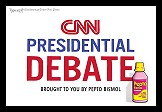 Sunday 'Bad Medicine' Toons
Sunday 'Bad Medicine' Toons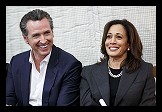 A Friendly Suggestion:
A Friendly Suggestion: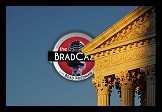 Former Fed Prosecutor: SCOTUS Corruption Ruling Less Corrupt Than Appears: 'BradCast' 6/27/24
Former Fed Prosecutor: SCOTUS Corruption Ruling Less Corrupt Than Appears: 'BradCast' 6/27/24 'Green News Report' 6/27/24
'Green News Report' 6/27/24
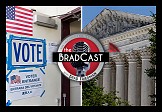 Good News and Bad: At the Polls and From the Corrupted Court: 'BradCast' 6/26/24
Good News and Bad: At the Polls and From the Corrupted Court: 'BradCast' 6/26/24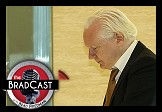 'Not Something Journalists Do': A NatSec Journo on Assange Hacking, Plea Deal: 'BradCast' 6/25/24
'Not Something Journalists Do': A NatSec Journo on Assange Hacking, Plea Deal: 'BradCast' 6/25/24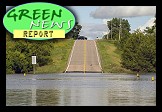 'Green News Report' 6/25/24
'Green News Report' 6/25/24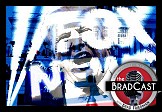 Fox 'News' Grooming Viewers for Another Insurrection: 'BradCast' 6/24/24
Fox 'News' Grooming Viewers for Another Insurrection: 'BradCast' 6/24/24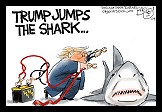 Sunday 'Shark Jumping' Toons
Sunday 'Shark Jumping' Toons The Prophecy and Warning of the White Buffalo: 'BradCast' 6/20/24
The Prophecy and Warning of the White Buffalo: 'BradCast' 6/20/24 'Green News Report' 6/20/24
'Green News Report' 6/20/24 CA Biz Group, WSJ 'Fabricate' $20/hr Fast Food Wage Stats: 'BradCast' 6/19/24
CA Biz Group, WSJ 'Fabricate' $20/hr Fast Food Wage Stats: 'BradCast' 6/19/24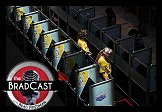 Interference Threats Loom Over November's Presidential Election: 'BradCast' 6/18/24
Interference Threats Loom Over November's Presidential Election: 'BradCast' 6/18/24 Inside White House Press Corps During Trump/COVID Era: 'BradCast' 6/17/24
Inside White House Press Corps During Trump/COVID Era: 'BradCast' 6/17/24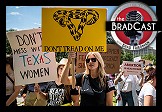 The Corrupt Anti-Abortion TX-to-SCOTUS Legal Mill Pipeline: 'BradCast' 6/13/24
The Corrupt Anti-Abortion TX-to-SCOTUS Legal Mill Pipeline: 'BradCast' 6/13/24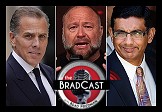 Hunter Conviction; Trump's Weaponized Ignorance: 'BradCast' 6/11/24
Hunter Conviction; Trump's Weaponized Ignorance: 'BradCast' 6/11/24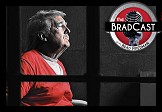 After Trump Verdict, GOPers Suddenly Warm to Voting for Felons: 'BradCast' 6/10/24
After Trump Verdict, GOPers Suddenly Warm to Voting for Felons: 'BradCast' 6/10/24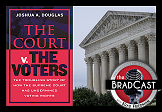 SCOTUS Has Been Undermining American Democracy for 50 Yrs: 'BradCast' 6/6/24
SCOTUS Has Been Undermining American Democracy for 50 Yrs: 'BradCast' 6/6/24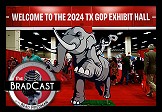 What Happens in Texas Does NOT Stay in Texas: 'BradCast' 6/5/24
What Happens in Texas Does NOT Stay in Texas: 'BradCast' 6/5/24
 VA GOP VOTER REG FRAUDSTER OFF HOOK
VA GOP VOTER REG FRAUDSTER OFF HOOK Criminal GOP Voter Registration Fraud Probe Expanding in VA
Criminal GOP Voter Registration Fraud Probe Expanding in VA DOJ PROBE SOUGHT AFTER VA ARREST
DOJ PROBE SOUGHT AFTER VA ARREST Arrest in VA: GOP Voter Reg Scandal Widens
Arrest in VA: GOP Voter Reg Scandal Widens ALL TOGETHER: ROVE, SPROUL, KOCHS, RNC
ALL TOGETHER: ROVE, SPROUL, KOCHS, RNC LATimes: RNC's 'Fired' Sproul Working for Repubs in 'as Many as 30 States'
LATimes: RNC's 'Fired' Sproul Working for Repubs in 'as Many as 30 States' 'Fired' Sproul Group 'Cloned', Still Working for Republicans in At Least 10 States
'Fired' Sproul Group 'Cloned', Still Working for Republicans in At Least 10 States FINALLY: FOX ON GOP REG FRAUD SCANDAL
FINALLY: FOX ON GOP REG FRAUD SCANDAL COLORADO FOLLOWS FLORIDA WITH GOP CRIMINAL INVESTIGATION
COLORADO FOLLOWS FLORIDA WITH GOP CRIMINAL INVESTIGATION CRIMINAL PROBE LAUNCHED INTO GOP VOTER REGISTRATION FRAUD SCANDAL IN FL
CRIMINAL PROBE LAUNCHED INTO GOP VOTER REGISTRATION FRAUD SCANDAL IN FL Brad Breaks PA Photo ID & GOP Registration Fraud Scandal News on Hartmann TV
Brad Breaks PA Photo ID & GOP Registration Fraud Scandal News on Hartmann TV  CAUGHT ON TAPE: COORDINATED NATIONWIDE GOP VOTER REG SCAM
CAUGHT ON TAPE: COORDINATED NATIONWIDE GOP VOTER REG SCAM CRIMINAL ELECTION FRAUD COMPLAINT FILED AGAINST GOP 'FRAUD' FIRM
CRIMINAL ELECTION FRAUD COMPLAINT FILED AGAINST GOP 'FRAUD' FIRM RICK SCOTT GETS ROLLED IN GOP REGISTRATION FRAUD SCANDAL
RICK SCOTT GETS ROLLED IN GOP REGISTRATION FRAUD SCANDAL VIDEO: Brad Breaks GOP Reg Fraud Scandal on Hartmann TV
VIDEO: Brad Breaks GOP Reg Fraud Scandal on Hartmann TV RNC FIRES NATIONAL VOTER REGISTRATION FIRM FOR FRAUD
RNC FIRES NATIONAL VOTER REGISTRATION FIRM FOR FRAUD EXCLUSIVE: Intvw w/ FL Official Who First Discovered GOP Reg Fraud
EXCLUSIVE: Intvw w/ FL Official Who First Discovered GOP Reg Fraud GOP REGISTRATION FRAUD FOUND IN FL
GOP REGISTRATION FRAUD FOUND IN FL


































